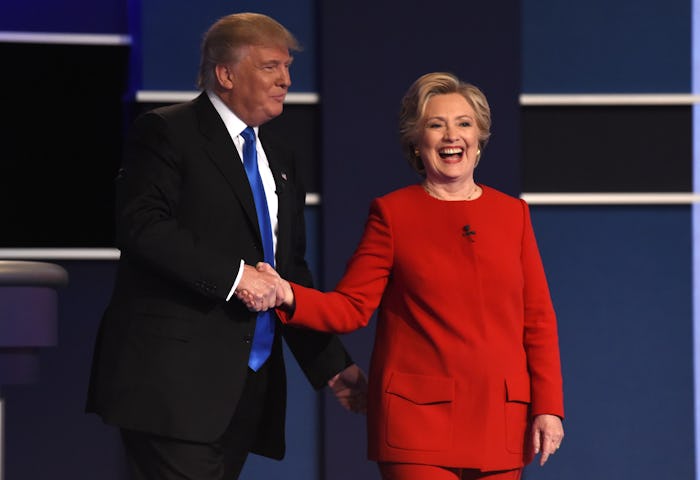News

How Do They Decide Which Online Questions Will Be Used For The Second Presidential Debate?
Democratic nominee Hillary Clinton and rival Donald Trump will face off for the second time in a town hall-style debate in St. Louis on Sunday. The Commission on Presidential Debates is trying out something new this time around, though. They're working with the Open Debate Coalition to source debate questions online for consideration by moderators, according to the Atlantic. But with more than 12,000 questions submitted, how are questions for the debate actually selected?
It's actually really cool, and very democratic. People submit questions, and they can vote on other questions they'd like to see asked. It's kind of like Reddit, in that one person can post something, and if other people like it, they'll "upvote" it to give it a more favorable spot on the page. Of course, users can upvote and post their own idea. Questions can be submitted at the Open Debate Coalition's website. Users can also vote on questions by simply inputting their email.
The 30 questions with the most votes will be considered by the moderators, CNN's Anderson Cooper and ABC's Martha Raddatz, when they plan the debate. A mix of questions from the online forum and the studio audience will be asked.
Mike McCurry, co-chairman of the Commission on Presidential Debates, said in a statement accompanying the announcement by the Open Debate Coalition that the online questions would enrich the debate by involving the American people:
This year’s presidential debate moderators will have a rich pool of voter-submitted questions they can draw on that carry greater weight because they are backed by votes from the American people.
At the time of publication, many of the most popular questions involved domestic policy, from gun reform and Social Security to healthcare and the economy. This is a perk of the voting format of the website, which allows only those questions that are the most important to the largest number of people to be shown in the top spots. It's a departure from the past methods of question submission, like Facebook or YouTube, where each question holds the same weight regardless of salience or relevance.
The Open Debate Coalition has said that its online question system allows for a "bottom-up open debate," according to USA Today. In April, U.S. Senate candidates in Florida tested out the system and gave favorable reviews. The candidates liked the format and the resulting substantive policy-based questions.
Based on those praises, the Commission on Presidential Debates teamed up with the coalition to further democratize the town hall-style debate. The debate will be live-streamed on the Open Debate Coalition's website and aired on all major television networks starting at 9 p.m. Eastern Time, according to Politico.
Hopefully, the use of this new method of crowd-sourcing questions means the candidates will be able to speak on the issues that Americans really care about instead of trivial personal attacks. We'll find out soon enough, but in the meantime, we should all fulfill our civic duties by posting or voting on questions on the coalition's website.